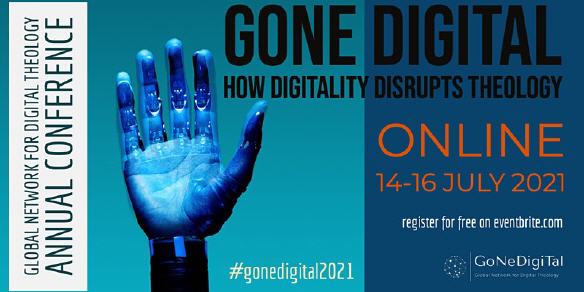Gone Digital, 14.-16.7.
Gone Digital: How Digitality Disrupts Theology
This conference explores the impact of digitality on theological thought, methodologies and dissemination.
Wed, 14 Jul 2021, 13:45 –
Fri, 16 Jul 2021, 17:15 CEST
The first annual conference by the Global Network for Digital Theology will be held online 14-16 July 2021. Registration is free but donations are welcomed.
Three broad areas will be investigated.
1. How digital theology alters/augments theology
Digital technology is today a major cultural force which has significant bearings on human societies and identities. Theological thought and reflection is always historically situated, inevitably shaped by socio-political and even technological dynamics. Thus, how does digitality change the cultural conditions in which theological thought and texts are constructed, and what are the implications for the content of these?
2. The future of seminaries and theology departments and of theological dissemination
Beyond such contextual consideration, the impact of digital technology on theological dissemination is already being felt. Digital technology not only changes the way that theology is taught and disseminated, it impacts where theological conversations take place and who can participate in them. What effect does this have on traditional theological institutions such as seminaries, theology departments and publishers, and how can they accommodate these changes?
3. Digitality and theological method
At a minimum, the very fact that most theologians write on laptops or desktops evidence the impact of digital technology on theological method. Beyond this, digital technology provides new tools for biblical interpretation, and for the analysis of church and world. How does digitality change the methods of theological enquiry?
SCHEDULE (times in GMT)
Wednesday 14 July: How digitality alters/augments theology
12.45 Introduction & Prayer
13.00 Session 1
Parallel Session A
“Digital and Technological Identities – In Whose Image?” | Anna Puzio (Munich School of Philosophy, Germany)
“Aether and Ethernet: Historical Perspectives on Immediacy and Liturgical Participation in a Digital Age” | Bishop Matt Brain (Bendigo, Australia), Srebrenka Kunek (My Pilgrims Way, Australia) & Fergus J. King (University of Divinity, Melbourne Australia).
Parallel Session B
“The Digital Theology Dilemma” | Damian Guzek (University of Silesia in Katowice, Poland) & Jan Słomka (University of Silesia in Katowice)
“Digital Theology from a Postcolonial Feminism Perspective’ | Oinike Natalia Harefa (Jakarta Theological Seminary, Indonesia)
14.15 Social on Wonder.me/gather.town
15.00 Session 2
“Inevitable Hybridity: Digital and Technological Paradigms for Revisioning Theology” | Katherine Schmidt (Molloy College, US)
“Theological Infrastructure: From Analog to Digital” | Adam Pryor (Bethany College, US)
Thursday 15 July: Digital Dissemination and the Future of Theological Education
12.45 Prayer
13.00 Session 3
“Teu le va in online spaces” | Dr Terry Pouono (Laidlaw College, NZ) & Stephen Garner (Laidlaw College, NZ)
“Digital Disruption and Opportunities for Theological Educators since COVID-19: A Singaporean Case Study” | Pak Wah Lai (Biblical Graduate School of Theology, Singapore)
14.15 Book panel: Heidi Campbell & John Dyer (eds), Digital Ecclesiology
1) "Exploring Ekklesia: Dualisms in Online, Virtual, Universal and Local Church" | John Dyer (Dallas Theological Seminary, USA)
2) "Locked Down but Not Locked Out: The Church and Media in a Pandemic Era" |Kwabena Asamoah-Gyadu (Trinity Theological Seminary, Ghana)
3) "Ecclesiology of 'Do Not Stop Them': Children, Creativity, and Connection" | Kate Ott (Drew University, USA)
4) "Digital Communication as Theological Creativity in a Participatory 'Church for and With All'" | Thomas Schlag and Sabrina Muller (University of Zürich, Switzerland)
5) "Liturgy as Persuasive Technology: Creating Liturgical Practices for Online Worship" | Jonas Kurlberg (Durham University, UK)
15.00 Session 4
Parallel Session A
“Disrupting the Learning Neighbourhood: Digitality, Decolonisation and the Future of the Theological College” | Andrew Stobart (Cliff College, UK)
“Digital Culture and Ministerial Formation: A New Approach to Theological Reflection” | Daniella Zsupan-Jerome (Saint John’s University School of Theology, US)
Parallel Session B
“The Time is Digital” | Jacqui Rivas (Gracepoint Methodist Church, SA)
“Explaining the Word: The Bible Project’s Digital Theology” | Chase Mitchell (East Tennessee State University, US)
Friday 16 July: Digitality and Theological Method
12:45 Prayer
13.00 Session 5
"God, Theology, and the Digital Age: Digitality and the Changing Contours of Theological Enquiry" |Kwabena Asamoah-Gyadu (Trinity Theological Seminary, Ghana)
“The transformative potential of religious-digital communication - the example of an Instagram-account as ‘networked theology’” | Thomas Schlag (University of Zurich, Switzerland) & Sabrina Müller (University of Zurich, Switzerland)
14.15 Social on Wonder.me
15.00 Session 6
Parallel Session A
“Cybertheology and Digital Theology: Approaches and Differences in the Brazilian Perspective” | Aline Amaro da Silva Pontifical (Catholic University of Rio Grande do Sul , Brazil) & Andréia Gripp (Pontifical Catholic University of Rio de Janeiro, Brazil)
“Relationship status: ‘It’s complicated’. DH-Methods and Systematic Theology” | Knut V.M. Wormstädt (RWTH Aachen University, Germany)
Parallel Session B
“Decolonisation/Recolonisation?: Digital Theology in the Post-COVID-19 World” | Calida Chu (University of Edinburgh, Scotland)
“Quid est veritas? – On Concepts of Epistemology and Truth in Digital Theology” | Christian Grund Sørensen (Aalborg University, Denmark)
To see the abstracts of the papers use the following link: https://docs.google.com/document/d/1O2MayXnBmnAIWC-FIVaCD6n5FhGiMsMyvR2_blkTIxQ/edit?usp=sharing
